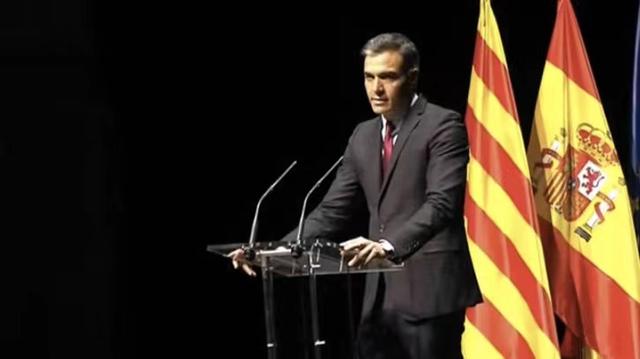To Spain now, where today, the country's central government pardoned nine politicians and activists who had been jailed after seeking independence for the region of Catalonia. They were leaders of the 2017 referendum on Catalan independence, which Spain said was illegal. All were convicted of sedition and sentenced to prison for up to 13 years. Reporter Alan Ruiz Terol is covering the story for the English-language Catalan News and joins us now from Barcelona.
Welcome.
ALAN RUIZ TEROL: Hi, Ailsa.
CHANG: Hi. So these pardons, I mean, they were announced by the prime minister's office in Madrid. Do we know why the government is taking this step right now?
RUIZ TEROL: Yeah. Today's pardons are widely considered to be one of the most consequential decisions that Pedro Sanchez will ever face as prime minister. And there's something he's said a few times, which I think really captures the message he's trying to send. It is that pardons will allow nine people to leave prison, but they will benefit millions more, especially the pro-independence supporters who believe their leaders shouldn't be in prison for basically delivering on their political promises. Sanchez has talked a lot about reconciliation, coexistence, basically recovering a relationship that has been damaged after years of political disagreements.
CHANG: And who exactly are the people who got pardons today?
RUIZ TEROL: So these nine people were basically some of the most important leaders of the independence movement back in 2017 when Catalonia held the unauthorized referendum. Most of them were politicians, former members of the regional government, the former speaker of the Catalan parliament. And there's also two activists who were jailed for leading protests against Spain's attempts to stop the vote. And some of these people continued to be extremely influential in Catalonia, for instance, the former vice president, Oriol Junqueras. And he recently expressed support for the pardons and even suggested that Catalonia should not attempt to hold a new unilateral referendum like it did in 2017. And this was seen by some as a key concession to the Spanish government.

CHANG: Well, Catalonia, I mean, it has had a very long history of seeking independence from Spain. Can you just talk with us about what has driven this movement?
RUIZ TEROL: Yeah, sure. Catalonia has its own language, its own history and a distinct pride. There's even many people in Catalonia who don't feel Spanish at all. And while there's always been people supporting Catalan independence, the movement really became mainstream a decade ago, more or less, when the financial crisis and austerity were hitting Spain extremely hard, and people were fed up with politicians. There was a tipping point. There was a ruling by Spain's top court against Catalonia's so-called new statute of autonomy, a kind of regional constitution, that had been backed by many Catalans. And for instance, constitutional court justices rejected the notion that Catalonia is a nation, and many Catalans didn't like this. So people started to attend massive pro-independence demonstrations. And the region's politicians didn't want to miss out, so they promised to deliver independence.
CHANG: Right. Well, where does this latest announcement of pardons leave the independence movement now in Catalonia?
RUIZ TEROL: Yeah. Some of these independence leaders will continue to play a key role, for sure. But they can't be as involved as they would like because the pardons are partial. This means that they can leave prison, but they are banned from holding public office. And they have been warned as well that should they be charged with new crimes, they'll be sent back to prison. But there are other politicians leading the movement now. And separatist parties actually continue to grow stronger, having recently surpassed 50% of the votes in an election for the first time.
CHANG: Wow.
RUIZ TEROL: And their two main goals right now are a general amnesty and a self-determination referendum.
CHANG: OK.
RUIZ TEROL: And while the Spanish government is willing to talk, it seems unlikely that they will make more concessions than these pardons because many people in Spain...
CHANG: Yes.
RUIZ TEROL: ...See them as too much already....
CHANG: OK.
RUIZ TEROL: ...Especially the right-wing parties.
CHANG: That is reporter Alan Ruiz Terol in Barcelona.
Thank you.











